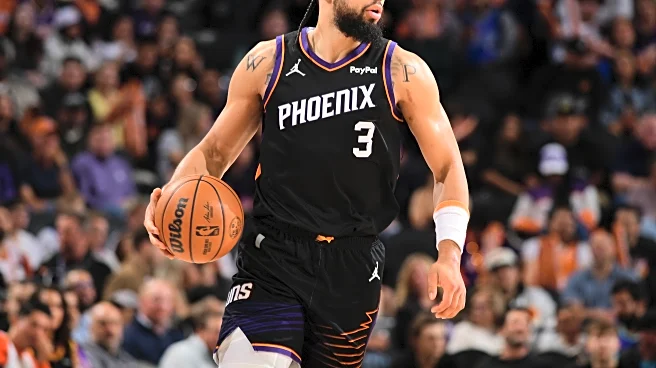What's Happening?
The Cleveland Browns have appointed Dillon Gabriel as their starting quarterback, following the trade of veteran Joe Flacco to the Cincinnati Bengals. Shedeur Sanders, a notable figure from CU, is currently
positioned as the backup quarterback. Despite Sanders' potential, the Browns are exercising patience, waiting for the right moment to introduce him as a starter. NFL Network's Ian Rapoport suggests that Sanders will eventually play this season, but only when he is fully prepared with a tailored game plan. The timeline for Sanders' debut remains uncertain, with speculation indicating it might not occur before December. The Browns are committed to giving Gabriel a chance to prove himself, but Sanders remains a key part of their future plans.
Why It's Important?
The decision to keep Shedeur Sanders as a backup reflects the Browns' strategic approach to quarterback development. By allowing Gabriel to start, the team is providing him with an opportunity to demonstrate his capabilities, which could influence the team's performance and future decisions. Sanders' eventual introduction could bring a fresh dynamic to the Browns' offense, potentially impacting their competitiveness in the league. The situation highlights the importance of strategic player management in professional sports, where timing and readiness are crucial for success. The Browns' approach could set a precedent for other teams managing emerging talent.
What's Next?
The Browns will continue to monitor Gabriel's performance as the starting quarterback. Should Gabriel falter or the team require a change, Sanders may be called upon to step into the role. The organization will likely assess Sanders' readiness through practice sessions and game simulations. Fans and analysts will be watching closely for any signs of a shift in the Browns' quarterback strategy, especially as the season progresses towards December. The team's decisions will be influenced by Gabriel's performance and Sanders' development, potentially leading to significant changes in their lineup.
Beyond the Headlines
The Browns' handling of Sanders' career progression raises questions about the broader implications of player management in the NFL. The decision to delay Sanders' debut could affect his career trajectory and market value. It also reflects the team's long-term planning and investment in player development. This approach may influence how other teams manage their emerging talents, balancing immediate needs with future potential. The situation underscores the complexities of sports management, where decisions can have lasting impacts on players' careers and team success.










